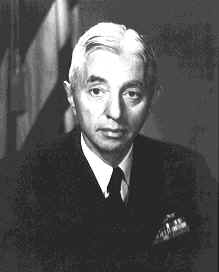
Admiral Hyman George Rickover
(1900-1986)
Vice Admiral Hyman George Rickover took the Navy into the atomic age with his persistence that the U.S. Navy build the first atomic-powered submarine.
He was born in Russian Poland in 1900 to Rachel, nee Unger, and Abraham Rickover, a tailor who brought his family to Chicago. After completing high school in 1918, Rickover received an appointment to the United States Naval Academy, where he was often confronted with anti-Semitism. He graduated in 1922 and was commissioned an ensign. Assigned to sea duty, he remained there for five years before being assigned to the Naval Academy to do graduate work in electrical engineering. He continued his studies at Columbia University where he received his M.S. degree in 1929.
Rickover's various assignments included his first command post aboard the U.S.S. FINCH in the Philippines. When World War II started., he was placed in charge of the electrical section of the Bureau of Ships in Washington, D.C. in the first of many wartime appointments.
In 1946, he was assigned to Oak Ridge, the site of the development of the atomic bomb. Rickover visited other nuclear research centers and he became convinced ships could be powered by nuclear energy. Almost alone in his belief, he finally convinced the Navy to begin to develop a nuclear submarine in 1947.
Before long he was placed in charge of the project and worked with the Atomic Energy Commission, which was going to build the reactors. The reactors were built in Idaho; the submarine in Groton, Connecticut. Finally, in January 1954, the first atomic-powered submarine, the NAUTILUS, was launched.
Despite his success, Rickover faced opposition both toward his work and toward his open criticism and remarks. After he had been twice passed over for promotion to admiral (the naval codes require retirement if promotion is twice denied), congressional leaders suspected that he was a victim of "foul play." Following an investigation, he was named a rear admiral in 1953. His many plans for nuclear ships were put aside during the Congressional hearings.
He is often credited with being President Jimmy Carter's mentor, but was a critic of President Reagan's defense budget, which he considered to be wasteful and too large. In 1982, he was forced into retirement at age 82. When Rickover retired, he expressed regrets on the role he played in nuclear proliferation and called for an international agreement to outlaw nuclear weapons and reactors because of the radiation dangers that they pose. He died on July 8, 1986.
Courtesy of:
http://www.jewishvirtuallibrary.org/jsource/biography/Rickover.html
